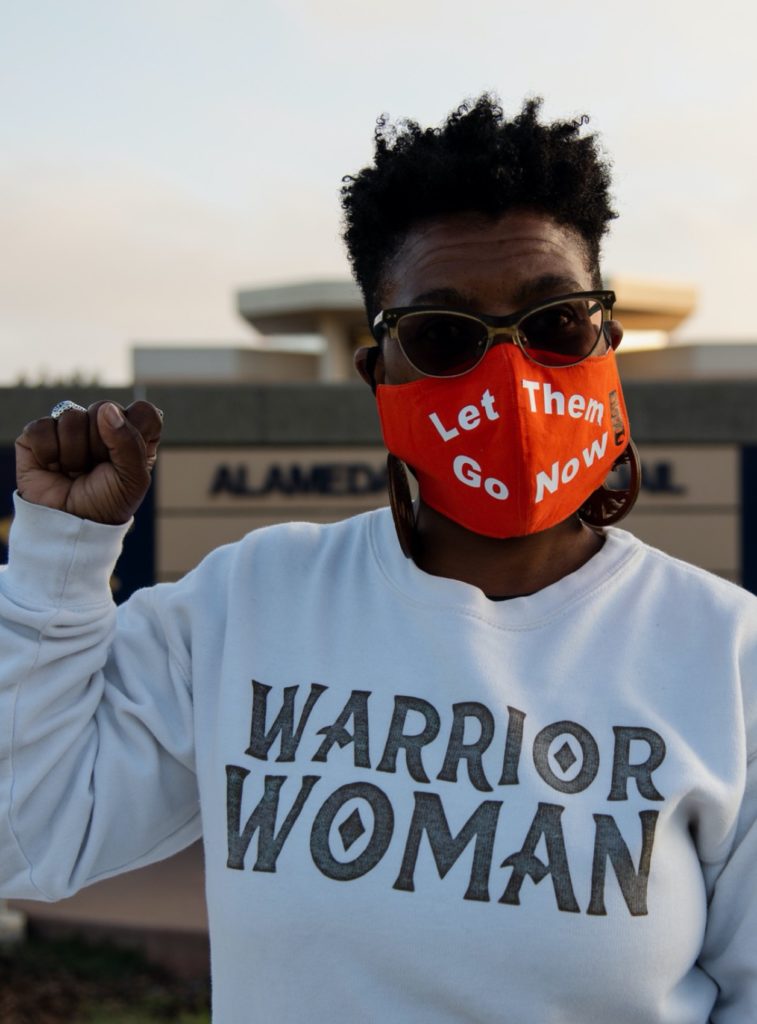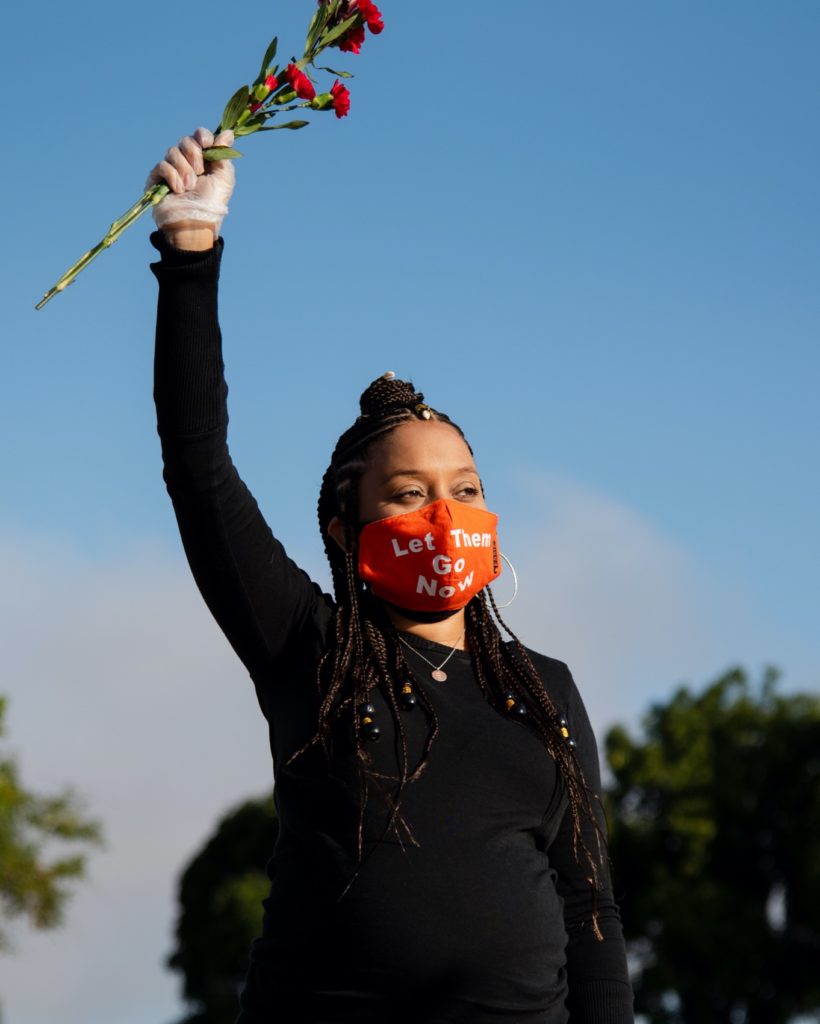Lives on the line: Women with Incarcerated Loved Ones and the Impact of COVID-19 Behind Bars
Incarceration has always posed a grave threat to public health. Jails, prisons, and detention centers subject people to dangerous, unhealthy, and inhumane conditions and experiences by design. So, when COVID-19 became a pandemic, we knew that our loved ones’ lives were on the line. We knew that the crowded, unsanitary conditions behind bars and a lack of access to medical care would mean that incarcerated people would be among those hit hardest by the virus. We knew that the patriarchal, punitive values embedded into the prison industrial complex would prevent incarcerated people from receiving the kind of care they need to survive
a pandemic. And we knew that this harm would ripple out to cause profound physical, emotional and economic harm for the communities that mass incarceration targets: historically marginalized people, especially Black and Brown communities and women.
In response, Essie Justice Group, in partnership with Color of Change, created the Lives on the Line survey for people with incarcerated loved ones. Knowing that carceral spaces are designed to obscure their own violence, the survey sought out concrete data that could illustrate what was happening behind bars and buoy the efforts of advocates across the country fighting to free incarcerated people amidst the COVID-19 pandemic. Carceral facilities are using COVID-19 as poor justification to further isolate incarcerated women, men, and people of all genders from the outside. Therefore, we put out a public call to people with incarcerated loved ones to share information and testimonies, acknowledging that women with family members behind bars are uniquely material witnesses to what is happening in prisons, jails and detention centers during COVID-19. Our survey ran over a four-week period from May 5th to June 7th, 2020. We received 709 responses.
The data we collected makes clear that what is happening with COVID-19 behind bars is a humanitarian and public health disaster. Jails, prisons, and detention centers are callously failing to take bare minimum measures to mitigate the spread of COVID-19, such as instating distancing protocols or providing adequate supplies of free soap, disinfectant, or masks to incarcerated people. Facilities have exploited the virus as an opportunity to further sever connections between incarcerated people and their support networks, including their lawyers and their loved ones. In a moment when people need to be released faster than ever, court dates, hearings, and release dates are being delayed. As a result, incarcerated people are suffering and dying from COVID-19 at alarmingly high rates. They and their loved ones live with fear, extraordinary anxiety, and extreme isolation. Incarceration is fundamentally incompatible with human dignity and human health; COVID-19 makes that undeniable.
A key objective of this report is to highlight the disparate impact of COVID-19 behind bars on Black people and Black women, uplifting the crisis as a gender and racial justice issue.
The United States has the highest incarceration rate in the world with approximately 2.3 million people behind bars across the country.(1) To put that number into perspective, the U.S. makes up about 5% of the global population but has nearly 25% of the world’s prisoners.(2) The brunt of these staggering figures has always been borne by Black people. Black people have been the targets of carceral practices and policies ranging from the War on Drugs and its attendant draconian maximum sentences to the violent over-policing that has recently sparked protests around the world.(3) As a result, Black Americans make up 40% of the incarcerated population, despite representing only 13% of U.S. residents.(4) The work of legal scholar Michelle Alexander, among many others, has exposed structural racism and racialized social control as both the cause and the function of mass incarceration in the U.S.(5) Black people have also borne a disproportionate share of COVID-19 infections as well as serious illness and deaths as a result of contracting the virus.(6)
This report also centers the distinct and acute harm caused to women, and particularly Black women, by the converging forces of COVID-19 and incarceration. Not only has women’s incarceration grown at twice the pace of men’s incarceration in recent decades, but one in four women, and one in two Black women, has an incarcerated family member.(7) The pandemic has only aggravated the financial hardship, increased childcare responsibilities, isolation, and physical and psychological stresses experienced by women with incarcerated loved ones.
Decades of carceral, patriarchal, and anti-Black policies have brought us to this devastating moment. Black and Brown communities can no longer afford half-measures or “tweaks” to the systems that are killing so many, so quickly. Especially in the wake of the black liberation rebellions sparked by the deaths of George Floyd, Breonna Taylor, Tony McDade, and so many others, elected officials, policymakers, and judges must seize this opportunity to meet their moral obligation to protect Black and Brown lives and make transformative, life-saving changes to our criminal legal system.
The most responsive way to staunch the flow of needless death is to mass release incarcerated people and close prison, jails, and detention centers. Prisons, jails and detention centers are fundamentally unable to operate safely and humanely because wellness runs contrary to their purpose. To put it another way, the cruelty is the point.(8) We must abandon the myths that carceral institutions keep people safe and embrace evidence-based solutions to address harm. Until everyone can be freed, carceral systems must be held accountable for mitigating the spread of the virus. Incarcerated people’s health, right to due process, and their ability to connect with their loved ones must take priority. Finally, incarcerated and formerly incarcerated people as well as cisgender and transgender women and gender non-conforming people with incarcerated loved ones deserve ample financial and emotional support to survive this pandemic and heal from the harms they have suffered.
————————————————————
1 Wendy Sawyer & Peter Wagner, Mass Incarceration: The Whole Pie 2020, Prison Policy Initiative, (Mar. 24, 2020), https://www. prisonpolicy.org/reports/pie2020.html.
2 American Civil Liberties Union, Mass Incarceration, https://www.aclu.org/issues/smart-justice/mass-incarceration (last visited Aug 19, 2020).
3 Drug Policy Alliance, Race and the War on Drugs, https://www.drugpolicy.org/issues/race-and-drug-war
(last visited, July 19, 2020)
4 Sawyer & Wagner, supra note 1.
5 See, e.g., Michelle Alexander, The New Jim Crow (2010); The Sentencing Project, Report of The
Sentencing Project to the United Nations Special Rapporteur on Contemporary Forms of Racism, Racial
Discrimination, Xenophobia, and Related Intolerance (March 2018),
https://www.sentencingproject.org/wp-content/uploads/2018/04/UN-Report-on-Racial-Disparities.pdf.
6 Ctr. for Disease Control & Prevention, COVID-19 in Racial and Ethnic Minority Groups (June 25, 2020),
https://www.cdc.gov/coronavirus/2019-ncov/need-extra-precautions/racial-ethnic-minorities.html.
7 Aleks Kajstura, Women’s Mass Incarceration: The Whole Pie 2019, Prison Policy Initiative (Oct. 29,
2019), https://www. prisonpolicy.org/reports/pie2019women.html; Gina Clayton et al., Essie Justice
Group, Because She’s Powerful: The Political Isolation and Resistance of Women with Incarcerated
Loved Ones (2018),
https://www.becauseshespowerful.org/wp-content/uploads/2018/05/Essie-Justice-Group_Because-ShesPowerful-Report.pdf.
8 Adam Serwer, The Cruelty Is The Point, The Atlantic (Oct. 3, 2018),
https://www.theatlantic.com/ideas/archive/2018/10/the-cruelty-is-the-point/572104/

